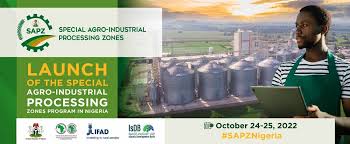There is renewed optimism across Nigeria’s agricultural sector following the official launch of the first phase of the Special Agro-Industrial Processing Zones (SAPZ) programme, which stakeholders believe will boost agro-exports, enhance food security, and reposition farmers as key drivers of economic growth.
The Federal Government, in collaboration with development partners, formally kicked off the initiative in Kaduna State earlier this week. The African Development Bank (AfDB), in a statement, confirmed that the programme’s initial phase is backed by a total investment commitment of $538 million. Of this sum, $210 million is coming directly from the AfDB, with additional support from the Islamic Development Bank (IsDB), the International Fund for Agricultural Development (IFAD), and ARISE Integrated Industrial Platforms.
The SAPZ initiative, designed to transform rural agriculture into a commercially viable and industrialised sector, is being hailed by key players in the industry as a major step towards solving long-standing issues in Nigeria’s agro-value chain.
Speaking on the development, Chairman of the Agriculture and Allied Group at the Lagos Chamber of Commerce and Industry, Tunde Banjoko, described the programme as a “fantastic idea” that is both timely and strategic. According to him, the move to site processing industries close to farming communities is a game-changer that will mitigate the issue of factories closing down due to shortages of raw materials.
“This is not just another funding intervention. What makes the SAPZ model different is the shared commitment from both the state governments and the private sector. That’s what gives it long-term sustainability,” Banjoko said.
He added that with local sourcing now being prioritised through the SAPZ clusters, Nigeria stands to not only improve food availability but also expand its capacity for agricultural exports over time.
“There’s going to be enough supply for local consumption and for the factories to keep running. That, in turn, will encourage exports and reduce the pressure on foreign exchange,” he explained, while urging more states to align with the programme and meet their counterpart funding requirements.
Similarly, the President of the All Farmers Association of Nigeria (AFAN), Kabir Ibrahim, praised the project, noting that it has the potential to revolutionise smallholder farming in Nigeria by adding value to farm produce and increasing farmers’ earnings.
“We’ve always suffered from exporting raw produce without value addition, which leaves farmers with very little profit. With the SAPZ, the narrative is set to change. Farmers will process their harvests near their farms and get better deals,” he said.
Ibrahim disclosed that a growing number of state governments have applied to participate in the SAPZ programme, exceeding the originally projected number of locations. He expressed confidence that the decentralised structure of the programme would give farmers across Nigeria access to modern processing facilities without the burden of long-distance transportation.
He also highlighted the programme’s capacity to address industrial power challenges by establishing independent power sources within the zones.
“Diesel and energy costs are a major constraint for food processors. But each SAPZ is designed to generate its own power. That will make production cheaper and more efficient,” he added.
Citing successful agro-industrial clusters in countries like the United States, Ibrahim said Nigeria was on the verge of replicating a similar ecosystem, where farmers benefit from collective processing, improved mechanisation, and higher income.
“With initiatives like this, we’ll see more farmers move from subsistence to commercial scale. Many who were considered poor will start building wealth through agribusiness,” he affirmed.
The SAPZ programme aligns with Nigeria’s broader goals of achieving food sufficiency, reducing post-harvest losses, curbing rural-urban migration, and positioning agriculture as a major contributor to GDP. With strong backing from international financial institutions and a growing interest from state governments, the scheme is expected to reshape Nigeria’s agricultural landscape and empower a new generation of agripreneurs.







